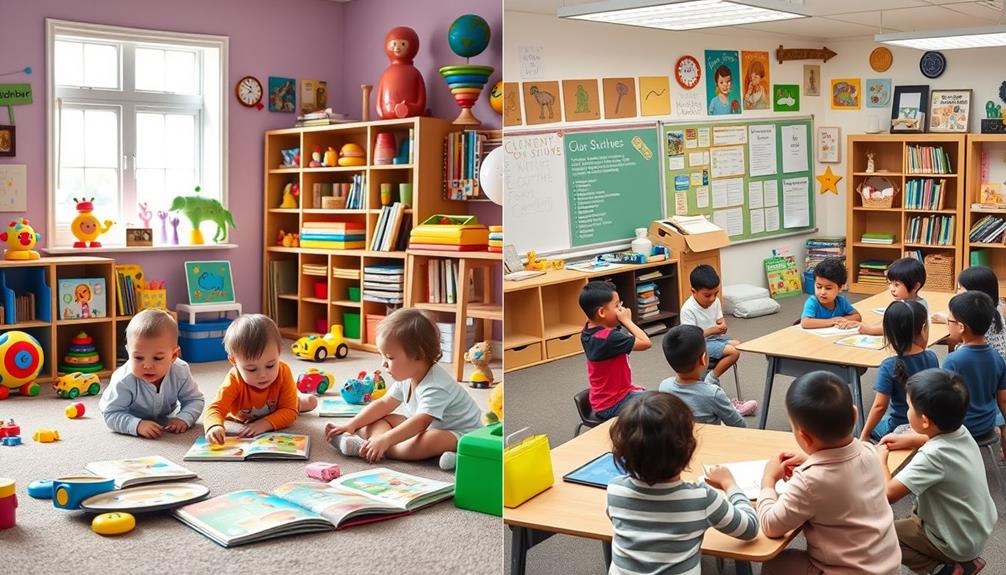Writing birthday letters to your mom in heaven can be a therapeutic way to cope with your feelings of loss and celebrate her life. It allows you to express sadness, nostalgia, and love in a tangible form. Each letter you write serves as a heartfelt tribute, helping you navigate complex emotions while cherishing memories. This practice not only fosters emotional release but also strengthens the ongoing bond you share. Engaging in this process can empower you to find healing and connection during important milestones. There's much more to explore about the impact of this writing journey and how it can benefit you.
Key Takeaways
- Writing birthday letters to your mom can facilitate emotional release and help process feelings of love and longing.
- Use sensory memories, like her favorite recipes, to evoke connections and celebrate her presence in your life.
- Share your letters with support groups or online communities to foster connection and empathy among others experiencing similar grief.
- Regularly revisiting your letters can acknowledge your complex emotions and reinforce the bond with your mom, honoring her lasting influence.
- Engage in family traditions on her birthday to honor her legacy and strengthen emotional ties with loved ones.
Understanding Grief and Healing
Grief can hit you like a wave, pulling you under with its intensity and unpredictability. You might find yourself swept away by a tide of emotions, from sadness to nostalgia, longing for moments you shared with your loved one.
Understanding grief as a non-linear journey is essential; it's not just about moving on but rather embracing the memories and acknowledging the ongoing presence of loss in your life. Just like maneuvering through the complexities of the divorce process, grief involves recognizing the various stages and emotions that arise as you heal.
Writing letters to your deceased loved one can serve as a therapeutic outlet, allowing you to express feelings that often remain pent-up. In those moments of solitude, you maintain a connection to your loved one, sharing not just your pain but also the joyful memories that bring a smile amidst the tears.
Support from others who've faced similar losses can also be invaluable. Engaging with a community that understands your emotions fosters empathy and reminds you that you're not alone on this path.
As you maneuver through your grief, remember that healing is possible by acknowledging your feelings, cherishing memories, and finding solace in the love that never fades.
The Process of Writing Letters

Writing letters to your mom in heaven can be a profound way to navigate your feelings and memories. This therapeutic writing process serves as an emotional outlet, helping you process grief while maintaining a connection with the deceased. On significant days, like her birthday in heaven, revisiting this practice can be particularly healing.
Engaging in this writing can also provide a sense of emotional support, much like the care and support for terminal illness that helps families cope with loss.
As you write, allow yourself to evoke a range of emotions, expressing both sorrow and cherished memories. You might share updates about your life milestones or simply articulate feelings of longing and love. Each letter becomes a meaningful ritual, fostering ongoing emotional expression and creating a safe space to honor her memory.
Engaging in this writing regularly helps you feel less isolated in your grief. It serves as a reminder that your connection with your mom endures, even in her absence. By putting pen to paper, you give voice to your emotions—transforming pain into a heartfelt tribute.
Cherishing Memories of Mom

Cherishing memories of your mom can be like a warm embrace, wrapping you in feelings of love and nostalgia. Cherishing memories brings her presence back to life, allowing you to recall her unique smile, the aroma of her cooking, and the laughter shared over family stories.
These sensory experiences evoke deep emotional connections that anchor you in her love. Engaging in family traditions, like lighting candles in remembrance, not only honors her legacy but also strengthens the bonds you share with relatives. You might find comfort in watching favorite family comedies, remembering how she'd laugh or comment on the scenes.
Reflecting on her nurturing traits can also be a way to appreciate the astrological compatibility she brought into your life.
Writing letters to your mother serves as a beautiful outlet for expressing your ongoing feelings. It's a way to convey how much you miss her, reflecting on the wisdom she imparted and the values she instilled.
Celebrating significant milestones without her can be bittersweet, yet it also allows you to recognize her influence and support in your life.
Connecting With Others in Grief

Finding solace in shared experiences can be a powerful way to traverse the journey of loss. Connecting with others who understand your grief offers a sense of community that can help you feel less isolated. Consider joining support groups, where you can openly discuss your emotional experiences and share your memories.
These spaces allow for empathy and validation, making it easier to process your feelings. Just as the cultural significance of ancient Hopi villages highlights the importance of community, your connections can serve as a foundation for healing.
Social media platforms can also serve as a valuable resource, providing a space for you to share your stories and connect with others facing similar challenges. Writing letters to loved ones can become a therapeutic outlet, creating a tangible connection to your emotions while resonating with others who may feel the same way.
Participating in community events honoring lost loved ones promotes collective healing. These gatherings allow individuals to share their memories, fostering connections that can be immensely comforting.
Finding Strength Through Expression

Although grief can feel overwhelming, expressing your emotions through birthday letters to your mom in heaven can provide a meaningful release. Writing these letters allows you to channel your love and longing into words, creating a structured way to process your feelings. This therapeutic practice fosters healing and maintains a connection with your mom, as you reflect on cherished memories and share your current emotions.
Here's a simple table to help you organize your thoughts for writing:
| Feelings to Express | Memories to Share |
|---|---|
| Love | Favorite birthday moments |
| Grief | Lessons learned from her |
| Nostalgia | Special family traditions |
| Joy | Fun activities together |
| Healing | Personal growth milestones |
Regularly revisiting this writing practice promotes ongoing emotional resilience. It encourages you to acknowledge complex feelings associated with loss while celebrating your mother's life. Each letter becomes a demonstration of your connection and her lasting influence, reinforcing the bond you share. Through this act of expression, you'll find strength in your journey toward healing.
Frequently Asked Questions
What Is the Best Birthday Message for Mom in Heaven?
When you think of the best birthday message for your mom in heaven, reflect on the love and joy she brought into your life.
Share specific memories that make you smile—like her favorite recipe or a cherished family trip.
Acknowledge your feelings of loss, but also celebrate her spirit.
You might include a quote she loved, ending with a heartfelt expression of love and a wish for her presence to continue guiding you.
How Do I Write a Letter to My Mom in Heaven?
When you sit down to write a letter to your mom in heaven, imagine her smiling down, wrapping you in warmth.
Start with heartfelt words of love, sharing cherished memories that dance like fireflies in your mind.
Update her on your life's milestones, letting her know she's still part of your journey.
Pour out your feelings—longing, joy, sorrow—making your heart lighter.
End with a promise to honor her memory, keeping your bond alive.
What Do You Say to a Deceased Mother on Her Birthday?
On your mom's birthday, you might want to share how much you miss her and reflect on the beautiful moments you'd together.
You can express your love and gratitude for everything she's done for you.
It's also a great time to update her on your life, sharing achievements or challenges.
Letting her know she's still in your heart can bring comfort as you celebrate her memory on this special day.
What to Say to My Mom in Heaven?
You might say, "Mom, I miss you every day, especially today.
Your laughter and warmth are irreplaceable. I cherish our memories, like those cozy evenings we spent together.
I wish you could see how much I've grown and celebrate my milestones with me. Your lessons guide my choices, and your love continues to inspire me.
I hold you close in my heart, hoping you feel my love across the distance."
Conclusion
As you put pen to paper, you might find that the letters you write to your mom in heaven become more than just words; they transform into a bridge connecting your heart to hers. Coincidentally, you may discover that in expressing your grief, you also uncover hidden joys and cherished memories. By sharing your feelings, you not only honor her memory but also find strength in your vulnerability. In this journey, you're never truly alone; your mom's love always surrounds you.










